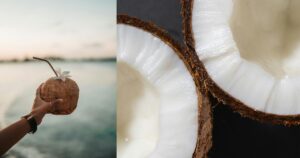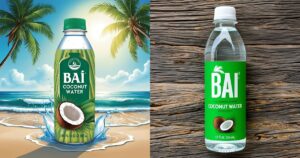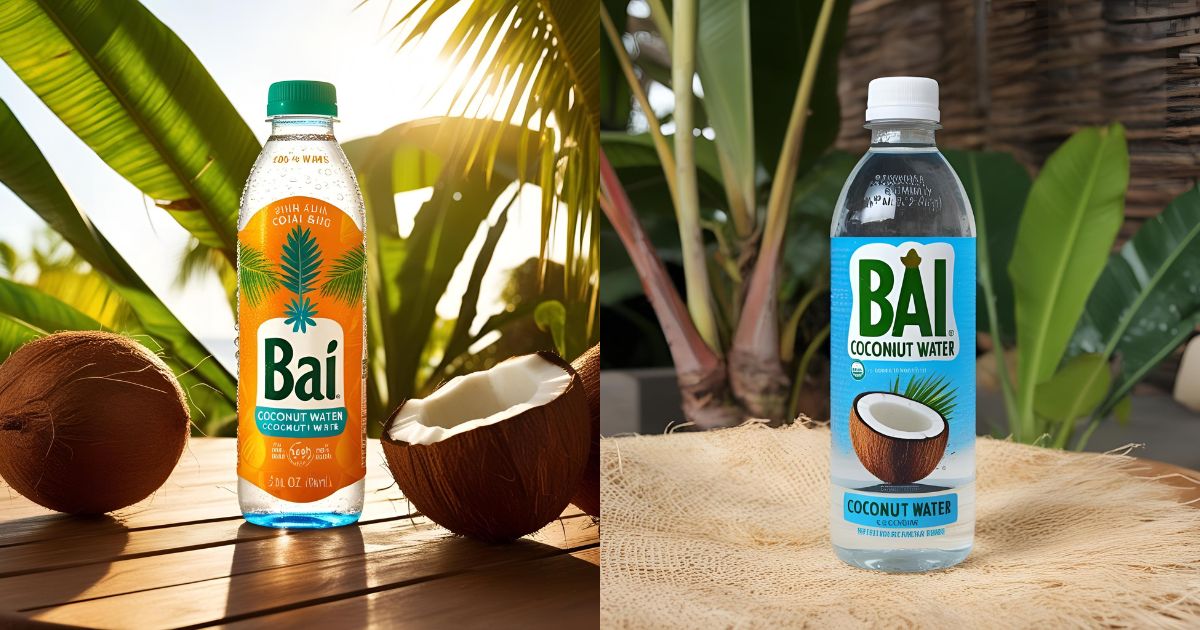Last updated on July 28th, 2025 at 11:48 pm
Is Bai Coconut Water Good for You?
Bai Coconut Water might seem like the perfect guilt-free drink — but is it actually good for your health?
The short answer: Yes, but with caveats.
It’s low in sugar and calories, packed with antioxidants, and promises hydration. Sounds great — until you check the label.
Inside each bottle, you’ll find more than just coconut water. Sweeteners, caffeine, and additives raise questions many health-conscious drinkers overlook.
In this guide, you’ll get a clear, evidence-backed breakdown of Bai’s ingredients, nutrition facts, and potential benefits.
We’ll also cover what the research (and real users) say about possible downsides — from bloating to blood sugar impact.
Plus, you’ll see how it stacks up against plain coconut water and whether it’s right for your diet or lifestyle.
If you’ve ever picked up a bottle and wondered if it’s worth drinking, you’re in the right place.
Let’s dive in — and help you make a smarter, healthier choice.
What Is Bai Coconut Water (Molokai Coconut Flavored Water)?

Bai Coconut Water, specifically the Molokai Coconut flavor, is a low-calorie, flavored beverage marketed as a healthier alternative to traditional sugary drinks. But what exactly is inside that sleek bottle?
Let’s break it down so you know what you’re actually drinking — and whether it’s a smart choice for your health.
Inside the Bottle: Ingredients That Matter
Bai isn’t just coconut water. It’s a flavored water blend with added ingredients aimed at boosting flavor, antioxidants, and shelf life.
Here’s what you’ll find:
Coconut water concentrate – A diluted form of coconut water used as the base.
Sweeteners – Stevia and erythritol provide sweetness without sugar spikes.
Antioxidant infusions – Coffee fruit and white tea extract add a dose of polyphenols.
Electrolytes – Naturally occurring potassium supports basic hydration.
Vitamins & minerals – Vitamin C and zinc are added for immune support.
These ingredients aim to give you hydration plus added functional benefits — without the sugar crash.
Nutrition at a Glance
Here’s what one 18 oz bottle of Molokai Coconut delivers:
Calories: ~10
Sugar: 1 gram
Caffeine: ~35 mg (from white tea extract)
Total carbs: 2 grams
Electrolytes: ~200 mg potassium
Low sugar and low calorie make it appealing if you’re watching your macros.
But keep in mind — while it mimics the vibe of coconut water, it’s not 100% pure. It’s more of a coconut-flavored functional drink.
What the Branding Promises
Bai positions itself as a healthy lifestyle drink — and its label reflects that:
Gluten-free
Vegan-friendly
Non-GMO certified
No artificial preservatives
Antioxidant-infused
These claims are eye-catching, especially if you’re seeking clean-label products.
But remember: “Antioxidant-infused” doesn’t guarantee clinically significant amounts. It sounds good — but you’ll want to look deeper into dosages.
What Users and Experts Say
Clean Eating Kitchen notes that while Bai is low-calorie, its sweeteners may not work well for everyone — especially if you’re sensitive to sugar alcohols.
Casa de Sante highlights its convenience and flavor for those seeking hydration with taste.
Reddit users often mention its caffeine kick and taste appeal, but some raise concerns over bloating or a “fake sweet” aftertaste.
Foodguides recommends it as a smart option for people looking for low-sugar, on-the-go drinks — especially compared to soda or juice.
Nutrition & Ingredient Breakdown

You want a drink that hydrates, tastes great, and doesn’t wreck your diet. Bai Coconut Water seems to check all those boxes — but let’s dig deeper into the facts.
I’ll break down its macronutrients, electrolyte content, and additives so you can make a smart, informed choice.
Macronutrients & Electrolytes: How Bai Stacks Up
Bai is low in sugar and calories, but how does it compare to real coconut water or your typical sports drink?
Here’s a quick look:
| Beverage | Calories | Sugar | Sodium | Potassium | Magnesium | Calcium |
|---|---|---|---|---|---|---|
| Bai Coconut Water | ~10 | 1 g | 65 mg | 200 mg | ~0 mg | ~0 mg |
| Plain Coconut Water | 45–60 | 9–12 g | 25 mg | 470–600 mg | 15–25 mg | 20–40 mg |
| Sports Drink | 80–140 | 20–34 g | 150–270 mg | ~40 mg | ~0 mg | ~0 mg |
| Plain Water | 0 | 0 g | 0 mg | 0 mg | 0 mg | 0 mg |
Takeaway:
Bai delivers fewer calories and sugar than sports drinks or natural coconut water — but you’re also getting fewer key electrolytes.
If you’re looking for post-workout recovery or replenishment after sweating, Bai may not provide enough potassium or sodium.
As TIME and EatingWell point out, coconut-flavored drinks often overpromise on hydration. The marketing makes it sound like a sports drink — but the electrolyte profile doesn’t fully support that claim.
Sweeteners & Additives Explained
Now let’s talk about what Bai uses to make the drink sweet without adding sugar.
Stevia: Zero-Calorie, But Not for Everyone
Bai uses stevia leaf extract for sweetness. It’s a natural, plant-based sweetener with zero calories and no blood sugar impact.
Sounds great, right?
But some research — and plenty of user reports — suggest stevia may alter gut microbiota over time. People on Reddit and Clean Eating Kitchen have also noted it can leave a metallic or bitter aftertaste, depending on your palate.
If you’re sensitive to sweeteners, this could be a red flag.
Erythritol: May Cause Digestive Issues
Bai also includes erythritol, a sugar alcohol often used in keto-friendly drinks. It gives a smooth sweetness — but for some people, it causes gas, bloating, or cramping, especially when consumed in larger amounts.
Clean Eating Kitchen cautions those with gut sensitivities (like IBS) to test tolerance carefully.
Natural Flavors & Fruit Juice Concentrate: A Mixed Bag
Bai includes natural flavors and small amounts of fruit juice concentrate to enhance taste. While these ingredients are common, they’re also highly processed and offer little nutritional value.
Think of them as flavor boosters, not health boosters.
Plus, there’s no fiber to slow sugar absorption — a reason some critics call this “empty sugar,” even if the total grams are low.
Health Benefits of Bai Coconut Water
So why do people still love Bai? Because it delivers some real perks — if used right.
Let’s explore the actual health benefits.
Antioxidants & Polyphenols: Are They Enough?
Bai contains coffee fruit extract, white tea, vitamin C, and polyphenols. These compounds have been linked to reduced oxidative stress and cell protection.
Sounds impressive — but dosage matters.
While Bai promotes its “antioxidant infusion,” the actual amounts are likely small. Experts at Clean Eating Kitchen and Foodguides suggest the health impact may be minimal unless you’re drinking several bottles daily — which brings its own problems.
Bottom line: You’re getting antioxidants, but not in therapeutic doses.
Hydration & Electrolyte Support: The Real Story
Bai contains about 200 mg of potassium per bottle. That’s helpful for mild hydration and basic electrolyte balance.
But serious athletes or heavy sweaters need more — especially sodium, which Bai lacks. According to TIME and SELF, this makes it better for casual sipping than hard-core recovery.
If you’re replacing soda or sweet tea, Bai is a clear upgrade. But don’t mistake it for a real electrolyte replacement drink.
Low Sugar & Calorie Benefits: Why It Wins the Comparison
Bai’s biggest selling point? It gives you flavor without the crash.
At just 10 calories and 1 gram of sugar per bottle, it’s way better than most:
Soda: 140+ calories and 39 g sugar
Fruit juice: 120+ calories and 20–30 g sugar
Sports drinks: Up to 140 calories and 34 g sugar
For anyone managing weight, blood sugar, or energy dips, Bai offers a low-calorie alternative that won’t spike insulin or add unnecessary carbs.
As gococo.app and Amazon reviews confirm, that combo of taste + low sugar is why Bai fans stay loyal.
Final Thought
Bai isn’t a miracle drink — but it solves a real problem: how to enjoy hydration and flavor without drowning in sugar.
If you’re not expecting full-spectrum electrolytes or massive antioxidant power, it can fit nicely into your daily routine.
Just be aware of sweetener sensitivity, especially if you have gut or metabolic concerns.
Read Also:
Risks & Limitations
Bai Coconut Water might seem like the perfect low-calorie drink — but it’s not for everyone.
If you’re sensitive to certain ingredients or managing specific health conditions, it pays to read the fine print.
Let’s break down the most common concerns.
Sweetener Sensitivity: Not All Guts Handle It Well
Bai uses stevia and erythritol to create sweetness without sugar. For many people, this combo works great.
But not everyone agrees.
Stevia can trigger a bitter aftertaste and, in rare cases, may interfere with hormone balance (according to anecdotal reports on Reddit and Clean Eating Kitchen).
Erythritol, a sugar alcohol, is known to cause bloating, gas, or cramping in sensitive individuals — especially those with IBS or gut health issues.
Takeaway: If you’ve ever had a bad reaction to sugar-free drinks, test Bai slowly or avoid it altogether.
High Potassium Caution: Know Your Limits
One 18 oz bottle of Bai contains ~200 mg of potassium.
That’s not dangerous for most people — in fact, potassium is great for hydration and blood pressure support.
But for individuals with:
Kidney disease
On ACE inhibitors
Or anyone with altered potassium metabolism
…even moderate potassium intake from drinks like Bai can lead to problems.
Sources like EatingWell and Real Simple note that too much potassium can build up in the blood when kidneys aren’t filtering properly — potentially leading to muscle weakness or heart rhythm changes.
Bottom line: If you’re at risk, check with your doctor before drinking Bai regularly.
Consumer & Quality Complaints: What Real Users Say
Despite the slick branding, some users have raised eyebrows over quality and taste issues.
From Amazon reviews, Reddit, and even trending TikTok videos, here are the most common complaints:
Inconsistent taste from bottle to bottle
Unusual colors or cloudy appearance
High sodium content in some batches
“Artificial” aftertaste — likely from stevia/erythritol blend
While these issues aren’t universal, they show Bai may not meet everyone’s expectations — especially if you’re used to natural or unprocessed drinks.
How Bai Compares to Plain Coconut Water & Other Hydration Drinks
Marketing can make Bai sound like the ultimate health drink. But how does it actually stack up against other hydration options?
Let’s compare.
Bai Coconut vs Natural Coconut Water
Natural coconut water is… well, natural.
It contains natural sugars, electrolytes, and small amounts of fiber.
It’s free from sweeteners, additives, or flavorings.
Bai, on the other hand, is processed.
It uses coconut water concentrate, not fresh coconut water.
It adds sweeteners, natural flavors, and fruit juice concentrates.
It contains little to no fiber, so it doesn’t have the same satiety or digestion benefits.
If you’re looking for hydration plus nutrients, pure coconut water is superior.
But if your goal is flavor + fewer calories and less sugar, Bai wins.
Bai vs Sports Drinks & Water
Let’s break it down:
Compared to Sports Drinks:
Bai has far less sugar and fewer calories
Contains natural antioxidants instead of artificial dyes
But lacks sodium, which is critical after intense workouts
If you’re exercising heavily or sweating a lot, sports drinks like Gatorade might be better for full electrolyte recovery.
Compared to Plain Water:
Water is cheaper, zero-calorie, and universally safe.
It hydrates just as well — or better — without any risk of gut upset or additive exposure.
As TIME and Real Simple highlight, water is still the gold standard for everyday hydration.
Bai is best seen as a low-sugar alternative to soda, not a replacement for real hydration sources like water or natural coconut water.
Final Word
Bai has its perks: it’s low-calorie, flavorful, and more health-conscious than sugary drinks.
But it’s not perfect — and it’s definitely not for everyone.
Before making it a daily habit, weigh the pros and cons.
Know your body, understand your sensitivities, and choose what fuels you best.
Who Might Benefit — and Who Might Avoid Bai
Not all drinks are one-size-fits-all — and Bai is no exception.
Here’s who might love it… and who might want to skip it.
Who Should Consider Drinking Bai Coconut Water
Bai can be a smart pick for:
Low-calorie drinkers — it has just 10 calories per bottle.
People cutting back on sugar — only 1 gram per serving.
Moderately active individuals — especially after light workouts or long walks.
Anyone craving flavored hydration — without the crash of soda or sugary juice.
It also appeals to those who want a touch of antioxidant support from ingredients like coffee fruit extract, tea, and vitamin C.
Who Might Want to Avoid It
Bai isn’t ideal for everyone. Be cautious if you:
Are pregnant or under 18 — it contains 35 mg caffeine per bottle.
Have kidney issues — due to potassium and sodium content.
Take ACE inhibitors or potassium-sparing medications.
Are sensitive to sugar alcohols like erythritol (which can cause gas or cramping).
Also, anyone avoiding processed ingredients may prefer natural coconut water or plain water.
Real User Insights & Community Feedback
Curious what everyday drinkers think?
Redditors and Amazon reviewers give us the unfiltered truth. Here’s what they say:
“Neither healthy nor unhealthy … has some good antioxidants … stevia … not particularly healthy.”
— Reddit user
“Feels weird … so I’ll do it in moderation.”
— Reddit user
Here’s what real users tend to agree on:
The Good:
Great taste — especially Molokai Coconut and Brasilia Blueberry
Low sugar and calories
Convenient hydration with more flavor than water
The Concerns:
Some report digestive issues from erythritol
Occasional complaints of inconsistent flavor or cloudy appearance
More expensive than plain water or traditional coconut water
Overall sentiment?
People enjoy Bai in moderation, but most don’t view it as a “super healthy” drink — more like a better alternative to soda or Gatorade.
Conclusion & Decision Guide
So, is Bai Coconut Water good for you?
Yes — with caveats.
It’s a healthy-ish, flavorful, low-calorie drink. But it’s not a magic hydration fix, and it’s not for everyone.
FAQ: Is Bai Coconut Water Good for You
Is Bai Coconut Water actually healthy?
Bai Coconut Water can be healthy in moderation. It’s low in sugar and calories, with antioxidants and electrolytes, but contains sweeteners and caffeine.
What are the main ingredients in Bai Coconut Water?
Bai contains coconut water concentrate, erythritol, stevia, tea extract, coffee fruit, natural flavors, vitamin C, and zinc.
How many calories are in Bai Coconut Water?
Each bottle of Bai Coconut Water contains about 10 calories and 1 gram of sugar.
Does Bai Coconut Water have caffeine?
Yes, Bai Coconut Water has around 35 mg of caffeine per serving from tea extract and coffee fruit.
Is Bai Coconut Water good for hydration?
Bai supports light hydration with potassium and electrolytes, but isn’t ideal for intense workouts due to low sodium levels.
Can Bai Coconut Water cause digestive issues?
Some people may experience bloating or cramping from erythritol and stevia, especially in large amounts.
Is Bai better than regular coconut water?
Bai is lower in sugar but contains added sweeteners and caffeine, unlike pure coconut water which is more natural and minimally processed.
Who should avoid Bai Coconut Water?
Pregnant women, kids, people with kidney issues, or those sensitive to caffeine or sugar alcohols should limit or avoid Bai.

Akash is our go-to expert on all things drinks — from soft drinks and sparkling water to coffee, tea, and energy beverages. With years of hands-on research, label analysis, and taste testing, he dives deep into caffeine content, ingredients, and brand comparisons to help readers make smarter choices. Whether you’re checking if a soda has caffeine or exploring healthier drink alternatives, Akash brings trusted, evidence-based insights with every article.. Read more about him here.

